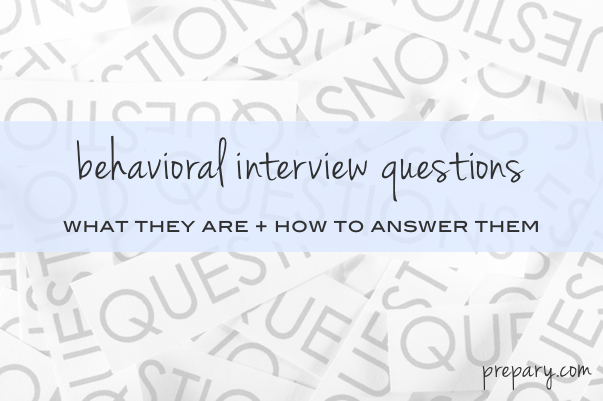Before I got into recruiting I didn’t really think too much about “types” of interview questions. I just kind of assumed I’d walk into an interview and the interviewer would ask me whatever they wanted. While that’s still true (anyone can just ask anything) behavioral interview questions get asked very often… and it’s important to know how to prepare for them.

So what is a behavioral interview question?
It’s a question that asks you to share a time in your past when you exhibited a certain behavior, skill, or handled a certain type of situation. The interviewer is looking for an answer containing an actual example versus a general statement – they want specifics.
Behavioral interview questions usually start out with statements like “Tell me about a time when…” or “Give me an example of…”
Say the job you are interviewing for requires strong analytical skills and expertise in excel. Instead of the interviewer asking “Do you know how to use excel to analyze data?” they would say “Tell me about a time when you used excel to analyze data and draw a conclusion.” Answering the first question is pretty easy – you might say “Yes, I am very proficient in Excel”. Answering the behavioral interview question is a little harder. You’d actually have to think back to a concrete example of when and how you used excel.
Why ask behavioral questions?
Knowing it’s more difficult to answer the 2nd question above gives some insight into why recruiters and interviewers use these types of questions. It’s believed that the most accurate predictor of future performance, is strong past performance. It’s also a lot harder to “fake” a past experience than it is to quickly lie and say “yes, I’m good at that”.
An answer to a behavioral interview question is also a much better indicator than one to a hypothetical question (“What would you do if…”) It’s easy to say what’d you believe you would do – but that’s not always great indicator of what happens in real life, under pressure.
How to answer this type of question
I think I’ll devote a full post to this topic in the future but in short, it’s important to have stories and examples ready for each of the job requirements. When you look at the job description, take a responsibility such as “Keep your customers up to date on new product developments” (taken from an Account Manager role) and have a story ready about a time when you told a customer about a new product and they signed on.
You’re not just trying to prove that you’ve done a certain thing – you’re trying to prove that you actually excelled at it. Having examples ready that are impressive and relevant to the job is key.
Looking to prep for behavioral questions? Check out our section on common interview questions.





